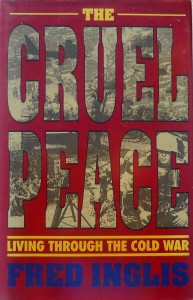Rating: 




The Cruel Peace: Everyday Life and the Cold War (1992) by Fred Ingliss
As one of the generation that grew up with the Cold War, what did it mean at the time? I now realise it was very much a third-hand experience, a vague, somewhat indeterminate, threatening presence that although seemingly far removed from teenage life, threatened to obliterate all. It was conveyed through television, above all, on the news, documentaries and films, but also newspapers and books.
`On the Beach’ by Nevil Shute, I remember reading as a 12 year old, a profoundly depressing story of the end of the world `not in a bang, but a whimper’. Later, `The Third World War’ by General Sir John Hackett, which pretty convincingly said that the so-called `nuclear peace’ since 1945, was a cover-up. Perhaps that was why I failed to feel enthusiasm when the Berlin Wall fell in 1989, although it would be churlish to ignore the changes for the better in Eastern Europe.
Of that time he writes:
“Margaret Thatcher and Ronald Reagan — both of them narrow, even bigoted, each blessed with luck, money and a strong will — by the accidents of electoral systems were brought to power at the same moment and with the same vision. They returned with a noisy to-do to the lessons they had learned in the early 1950’s, when the machine of Stalinism far exceeded in reach and power the mad old despot’s grasp on reality. By invoking these lessons, they reawoke anti-socialist fear and loathing for 10 years, and in a lot of people.”
It is easier to make the case, though, that the world is now a more dangerous place than it was then. Why, then, beyond the obvious, is the threat of universal annihilation so difficult a concept to explore? This book gives a very convincing argument that the future for this world looks like an old East Berlin street, with a big, grey wall across the end of it. The media have always struggled to convey this enormity, and prefer a focus on individuals, like the famous picture of the little Vietnamese girl crying in the road, as thousands of refugees streamed past.
To learn about the role of intelligence and counterintelligence on both sides during the cold war, the author much prefers the novels of John le Carre to the supposed actions of the Central Intelligence Agency. He claims for example, that the C.I.A. contributed to President John F. Kennedy’s disastrous decision to invade the Bay of Pigs with Cuban mercenaries, as well as to the Chilean coup that led to the death of President Salvador Allende.
This is a complex subject, and I do empathise with the many that cannot or will not comprehend the effects of it. Politics, too, leaves me cold, but not so, people, and their behaviour. Why do we so quickly shy from considering total war and wonder what’s for supper? See another `state of the planet’ documentary advertised, and then watch East Enders? For film-makers, it is not for the want of trying. At the time of writing, 2012 is in the cinemas. Are they planning a sequel, 2012:2? I recommend this book for its power to make you think, and the memories it evoked when discussing films and television in particular, and for the reminder that peace is not defined as the absence of war. Take the theme of `Lord of the Rings’, itself seemingly inspired by the dark shadow of nuclear destruction.
Writing about the Cold War seen through the eyes of popular media was always going to lead to the question of what to leave out, but for me there are curious omissions, such as Colossus – The Forbin Project [1970] [DVD], with the interesting concept of peace imposed without the consent of the protagonists.
All that can be said here and now is that no doctor treats a disease without a thorough knowledge of its history and symptoms. `The Cruel Peace’ outlines the symptoms of the current, continuing malaise, and its recent past.